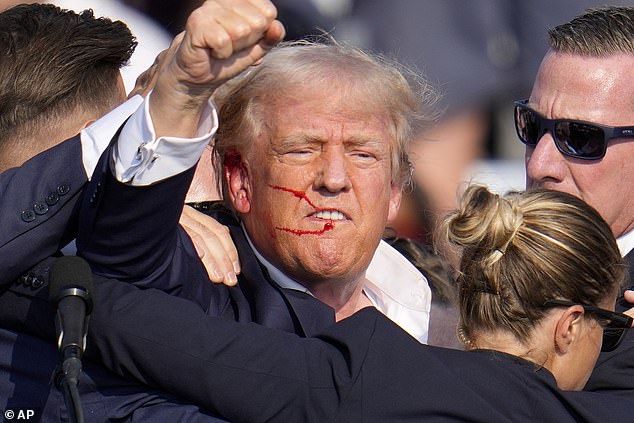Is anyone looking after Donald Trump? Even the strongest leaders suffer psychological scars. I know at least one more politician who needs help, writes DAN HODGES
Donald Trump did his best to hide it. But as he walked into Milwaukee’s Fiserv Forum for his first appearance since the assassination attempt on his life on Saturday, his body gave him away. The smile was steady. The walk was slow and slightly hesitant. As he looked out at the vast crowd of supporters cheering him wildly, he suddenly stared down, as if trying to block out the moment.
Much has been said and written in the days since the shooting, focused on the implications for the presidential race and the broader toxicity of American political culture. There has been a resurgence of debate over gun control and the perceived failings of the U.S. Secret Service, which in turn has spawned a plethora of online conspiracy theories.
But there has been virtually no discussion of what it means for Donald Trump, the man. Less than 48 hours earlier, death had literally run its fingers down his cheek. And yet there he was, pushed out into an arena of thousands chanting, “Fight! Fight! Fight!” the words Trump shouted immediately after the shooting.
Donald Trump attends the Republican National Convention at the Fiserv Forum in Milwaukee with his ear bandaged after the attempt on his life
And he will fight. Whatever your opinion of Trump, there’s no doubting the courage and pride he showed in the immediate aftermath of the attack. A part of him will no doubt revel in his near-martyrdom. But there’s something faintly obscene about the way our political circus washes the blood off the stage and moves on. It demands that its acrobats and jugglers bind up their wounds—physical and psychological—and keep performing. Or be casually cast aside if they can’t.
Last week I spoke to a member of parliament who had narrowly lost her seat in the election. What she experienced was clearly very different from what the former president experienced on the Butler Farm showground. But it still cut deep.
“I was at the count,” she told me, “and I suddenly felt like I was at my own funeral. I was standing on the podium listening to the returning officer, and my life as I knew it was ending. It was like hearing them read my own obituary.”
Democracy is by definition brutal. Those in power must regularly account to the people. And national governance is a tough business, requiring resilience and robustness. But now is the time to start a good conversation about the mental health of our politicians.
I personally know a prominent senior politician who is currently in serious need of psychological support. But for some reason, no form of appropriate care is being provided. They appear on the airwaves. They continue to write commentaries for newspapers. They regularly promote themselves on social media. All this is done with the knowledge and consent of people they would call their friends and ‘allies’.

The former president, covered in blood from the bullet that grazed his ear, raises his fist during the event in Pennsylvania on Saturday
What they desperately need, however, is a period out of the public eye, away from the constant criticism and outrage of their opponents, in which they can properly process and manage their very real feelings of personal and political grief.
This is not an isolated case. We value ‘toughness’. All too often, that forces our politicians to put on a facade. I know another senior politician who is known as ‘a fighter’ and who has been significantly affected by the abuse he has suffered in his cabinet role. Again, they need the right support. And again, there is none.
Nor are these mental health problems confined to our most senior politicians. A few months ago I spoke to a backbencher who had become increasingly obsessed with a political issue and angry at what he saw as the media’s failure to adequately cover it. ‘You are complicit,’ they told me, ‘and there will be a reckoning. We won’t waste bullets on you, we’ll strangle you. You are on the side of the Nazis. And “I was only following orders” will not be an excuse.’
That’s one of the more extreme cases. But there’s a complete lack of formal mental health care in one of the most stressful public jobs. I asked a civil servant who had worked for one of our former prime ministers if they had had counselling when they left office. He laughed. ‘Not that I know of. And I don’t think they would have taken it if it had been offered. Their attitude is, “That’s the way it is, you just have to accept it and get on with it.”‘
Yet even the strongest figures find it hard to just keep going. Or if they do, it leaves scars. Immediately after the Brighton bombing, Margaret Thatcher slept for a few hours on a bunk bed in a local police station, then stood up and addressed her party conference. It was an incredible display of statesmanship and defiance.
But the experience changed her. Those closest to her noted in the years that followed how Brighton had made her more reserved and thoughtful. Her personal assistant Cynthia Crawford told how the prime minister’s husband, Denis, had gone to Bond Street in the weeks after the attack and bought her a watch. ‘She told me he said, “This is to let you know that every minute counts.” I think deep down she knew she had been lucky that night, very lucky.’
Donald Trump will never admit it. But he also needs people to be there for him in the coming weeks and months. And that includes our own politicians.
